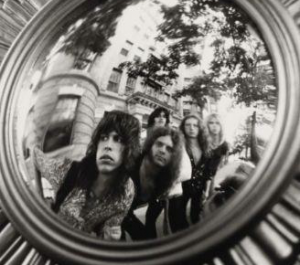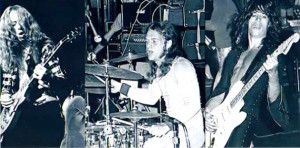I’ve never read a book regarding the music of Aerosmith. I’m not even sure one exists. I don’t mean a book about the band either — I know those exist and I know what probably concerns their narrative most, being lots of booze, drugs, and women with slippery pants. The fact is that their music hasn’t always warranted closer inspection, and that the surface pleasures of so much of the band’s work adequately covers the surface pleasures discussed in the band’s work. However, the song “Dream On” has always been different. It was different from the moment it became a hit in the early ’70s, and today in the age of the screamingly obvious, it seems even more of an anomaly.
 I say screamingly obvious because pop music, where we are right now, has no interest in levels and layers. Before you dismiss me as just another crank bemoaning that the past was better than now, take a listen to the top 40 right now. Happy lyrics, happy melodies, or sad lyrics, sad melodies, and there’s nothing inherently wrong with that. Sometimes the guileless nature of being right on the nose is a worthwhile endeavor. But sometimes, when it happens all the time, it just feels artless.
I say screamingly obvious because pop music, where we are right now, has no interest in levels and layers. Before you dismiss me as just another crank bemoaning that the past was better than now, take a listen to the top 40 right now. Happy lyrics, happy melodies, or sad lyrics, sad melodies, and there’s nothing inherently wrong with that. Sometimes the guileless nature of being right on the nose is a worthwhile endeavor. But sometimes, when it happens all the time, it just feels artless.
You could also say that Aerosmith can be fairly artless, as they reclaimed the top of the charts in the late ’80s and early ’90s, tossing off double entendre and come-on, one after another. What were they up against in the early seventies though? They were probably looking down the barrel of the Laurel Canyon singer/songwriter movement spreading over from the West Coast, which must have seemed uniquely foreign to their Bah-stun brand of blooze/sleaze. The charts would have been saturated with Gilbert O’Sullivan being alone again, or Edward Bear singing his last song, or Terry Jacks recounting his seasons in the sun.
Into that churning toxic fudge comes a song that, if you read it off a sheet, would not be all that different from a lot of the inspirational, affirmational tunes of now. “All these lines on my face gettin’ clearer, the past is gone” and “Dream until your dreams’ll come true” scan like they should be paired with bouncy, major-chord dance rhythms. They should, but aren’t. “Dream On” is a dirge. It’s a descent into madness. The interest lies in the figurative dissonance between those uplifting words and just how doomed the music sounds. Let’s not forget the literal dissonance of the last few notes of the track, weaving back and forth like a busy signal on an abandoned telephone; in the distance, the strike of a gong still vibrates.
“Dream On” is in fact a blues song, perhaps more in line with the British iteration of it that was prevalent in the late ’60s. It is Peter Green’s Fleetwood Mac, or Cream, and not the “honey stick your hands down my pants” immediacy of Free, or the sex-confused-mysticism of Led Zeppelin. Steven Tyler, still singing with a voice padded with baby fat and not quite rocked and reeled by the chemical harvest, assumes the role of the itinerant bluesman who strolls into town with his guitar and nobody gives a preacher’s damn about him. Nobody listens as he plays his song, or drops a coin into his hat as it sits on the sidewalk. He’s singing “dream until your dream’ll come true” as a salve for his own wounded pride. He came in with his six string slung over his shoulder like a samurai, but he’ll leave with his tail between his legs like a beaten dog.
That anguished screech at the end sounds more like someone being confronted by awful, painful truth than a victory wail, and that it should precede those Hammer Horrors tones that close the song out is indicative. He’s going crazy, maybe only a little but, but a little crazy is still a difficult state of mind. That same screech would become Tyler’s stock-in-trade, and wouldn’t have nearly the same level of importance to their accompanying songs.
But the truth is that I cannot tell whether any of this was considered beforehand, whether this was in fact the goal all along. Maybe this is just what rockers, not pop stars, sounded like then, and it is only a quirk of the audience and times that the tune would place itself next to “Billy Don’t Be A Hero” or “The Night Chicago Died.” As I said from the outset, I’m not concerned with finding out the private lives of the members of the band, and I’m sure that’s all I’d get from critical written work. I’m also sure that, of the decades of music Aerosmith has produced, very little of it warrants deep consideration. “Dream On” does, and I would like to know if my uneducated assumptions have any merit.






Comments